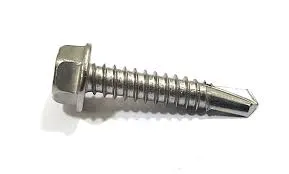Understanding Self-Drilling Taps and Their Applications in Various Industries
Understanding Self-Drilling Taps Overview and Applications
Self-drilling taps are specialized tools designed to simplify and expedite the process of creating threaded holes in various materials. These innovative fasteners combine a drilling and tapping operation into a single tool, allowing users to drill and tap holes in one step, significantly enhancing efficiency in manufacturing and construction processes. This article delves into the features, benefits, types, and applications of self-drilling taps.
What are Self-Drilling Taps?
Self-drilling taps, also known as self-tapping taps, are fastening tools that feature a drill bit and a tap in one unit. Unlike traditional taps that require pre-drilled holes, self-drilling taps can penetrate materials directly. They possess a sharp, pointed tip that initiates the drilling process, followed by threads designed to cut into the material. Once inserted, they create internal threads as they advance, enabling secure fastening without the need for separate drilling and tapping operations.
Key Features
1. Dual Functionality The primary advantage of self-drilling taps is their dual functionality, allowing users to drill and tap simultaneously, which saves time and increases productivity.
2. Material Compatibility These taps are designed to work with various materials, including metals, plastics, and composites. Their versatility makes them a popular choice in multiple industries.
3. Ease of Use Self-drilling taps are user-friendly, typically requiring only a power tool or drill for operation. This user-oriented design makes them suitable for both professionals and DIY enthusiasts.
4. Variety of Sizes and Types Available in different sizes and thread types, self-drilling taps can cater to various specifications and project requirements.
Benefits of Self-Drilling Taps
- Increased Efficiency By eliminating the need for separate drilling and tapping steps, self-drilling taps considerably reduce labor time and total project duration.
- Cost-Effectiveness Combining two operations into one tool reduces overall tooling costs and minimizes equipment wear and tear, leading to lower maintenance costs.
- Precision Self-drilling taps are engineered to deliver precise threading, ensuring a consistent and reliable fit for fasteners.
- Reduced Risk of Damage The design of self-drilling taps minimizes the risk of damaging the workpiece compared to traditional drilling and tapping methods, as it requires less force and results in cleaner holes.
self drilling taps

Types of Self-Drilling Taps
There are several types of self-drilling taps, each designed for specific applications
1. Flute Taps These taps feature spiral grooves that allow for the removal of chips generated during the tapping process, enhancing performance in metals.
2. Thread Forming Taps Instead of cutting threads, these taps deform the material to create threads, which can provide higher strength and better resistance to wear.
3. Screw Taps These taps resemble screws and are often used for softer materials. They effectively create threads while also providing a strong hold for fasteners.
4. Combination Taps Equipped with a built-in drill bit and tap, combination taps are specifically designed for use in thin materials, like sheet metal.
Applications of Self-Drilling Taps
Self-drilling taps find widespread use in various industries due to their efficiency and versatility. Key applications include
- Automotive Industry Used for assembling parts and components where precision and speed are critical.
- Construction Essential for fastening materials in metal and wood frameworks, especially when dealing with pre-fabricated components.
- HVAC Systems Commonly employed in the manufacture and installation of heating, ventilation, and air conditioning systems.
- Electronics Utilized in crafting circuit boards and chassis, where precise and secure fastening is paramount.
Conclusion
Self-drilling taps represent a significant advancement in fastening technology, combining drilling and tapping into a single, versatile tool. Their efficiency, ease of use, and broad application range make them indispensable in modern manufacturing and construction. Whether you are a professional tradesperson or a DIY hobbyist, incorporating self-drilling taps into your toolkit can greatly enhance your project outcomes and operational efficiency.
-
Weatherproof Plastic Expansion Anchors for OutdoorNewsJun.06,2025
-
Sustainability in the Supply Chain: Eco-Friendly TEK Screws ProductionNewsJun.06,2025
-
Load-Bearing Capacity of External Insulation FixingsNewsJun.06,2025
-
Double Head Bolts: Enhancing Efficiency in Industrial MachineryNewsJun.06,2025
-
Corrosion Resistance in Chipboard Screws: Coatings for Wholesale DurabilityNewsJun.06,2025
-
Butterfly Toggle Bolts : Enhancing Structural ResilienceNewsJun.06,2025
